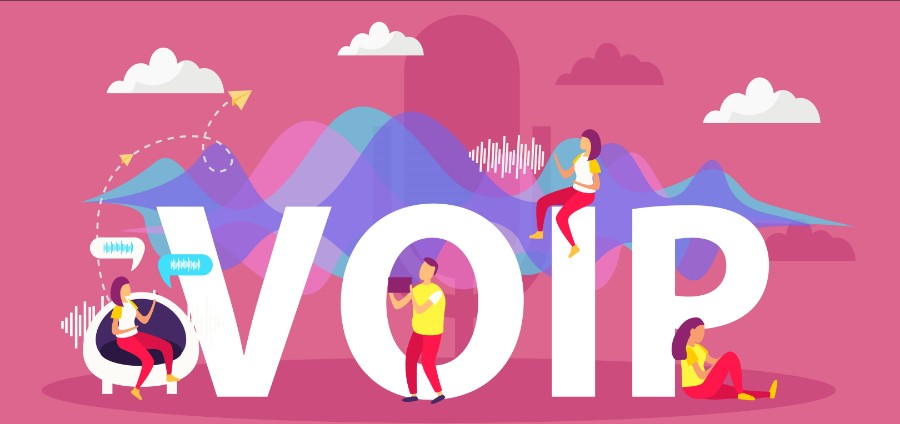Executive Summary: AI-powered VoIP solutions, enhanced by WebRTC, enable browser-based voice and video calls with features like call transcription, sentiment analysis, and virtual assistants. These tools help SMBs save 30-50% on communication costs while improving efficiency and customer service.
Imagine running a small business and cutting your phone bill by 40% while having AI transcribe every client call with 95% accuracy. AI-powered VoIP solutions, combined with WebRTC (Web Real-Time Communication), make this possible by enabling seamless, browser-based communication without downloads. As of 2025, the VoIP market is projected to reach USD 183.7 billion by 2027, with AI and WebRTC driving growth. For SMB owners like Sarah, a 38-year-old running a 15-person marketing agency, these solutions offer cost savings, flexibility, and enhanced customer experiences. This guide explores how AI and WebRTC transform VoIP, with practical insights, case studies, and steps to get started. Ready to revolutionize your communication? Let’s dive in.
What is WebRTC and Its Role in AI-Powered VoIP?
Summary: WebRTC enables real-time, browser-based voice and video calls, providing a foundation for AI-powered VoIP features like transcription and analytics, ideal for SMBs.
WebRTC (Web Real-Time Communication) is an open-source technology that allows browsers like Chrome and Firefox to handle voice, video, and data communication without plugins. When paired with AI, it enhances VoIP by enabling advanced features directly in web applications.
Defining WebRTC
WebRTC, standardized by W3C and IETF, uses APIs like getUserMedia and RTCPeerConnection to capture and stream media. It’s supported by major browsers, making it accessible for businesses.
How WebRTC Enhances AI-Powered VoIP
WebRTC’s browser-based platform allows AI to process real-time call data for transcription, sentiment analysis, and automation. For example, a marketing agency can use WebRTC to host client calls via a website, with AI analyzing conversations instantly.
Example: Sarah’s agency uses WebRTC to enable click-to-call features on their website, with AI transcribing client feedback.
WebRTC’s market is expected to reach USD 9.56 billion in 2025,” per industry reports.

AI-Powered Features in VoIP Enabled by WebRTC
Summary: WebRTC facilitates AI-driven VoIP features like real-time transcription, sentiment analysis, and virtual assistants, enhancing communication efficiency.
WebRTC’s ability to stream high-quality audio and video in browsers makes it a perfect platform for AI to analyze and enhance calls.
Real-Time Call Transcription
AI transcribes calls with over 95% accuracy, capturing details for record-keeping or compliance. WebRTC’s getUserMedia API feeds audio to AI models for processing.
Sentiment Analysis in Calls
AI analyzes tone and language to detect customer emotions, helping agents respond effectively. WebRTC ensures low-latency audio for accurate analysis.
Virtual Assistants and Bots
AI-powered bots handle routine tasks like call routing, powered by WebRTC’s real-time capabilities.
|
Feature |
Benefit |
WebRTC Role |
|---|---|---|
|
Call Transcription |
Saves time, ensures compliance |
Streams audio for AI processing |
|
Sentiment Analysis |
Improves customer service |
Delivers low-latency audio |
|
Virtual Assistants |
Automates routine tasks |
Enables browser-based access |
AI transcription is a game-changer for SMBs,” says Dr. Emily Chen, Telecom Consultant.
Leveraging AI Bots and Analytics in Your VoIP System
Summary: AI bots and analytics, powered by WebRTC, automate customer interactions and provide data-driven insights, boosting efficiency for SMBs.
AI bots and analytics transform VoIP into a powerful business tool, with WebRTC enabling seamless browser-based access.
Functions of AI Bots
AI bots handle tasks like answering FAQs, scheduling appointments, and qualifying leads. WebRTC allows these bots to operate via browser calls.
Analytics for Better Decision Making
AI analytics track call volume, agent performance, and customer satisfaction, providing actionable insights. WebRTC’s real-time data streaming supports this.
Integration with WebRTC
WebRTC’s APIs enable bots to interact in real-time, while analytics process call data instantly.
Example: A tech startup used Twilio’s AI bots with WebRTC to qualify leads, increasing conversions by 20%.
AI bots handle 70% of customer interactions,” per Gartner.

How VoIP Uses AI to Summarize Calls and Improve Customer Service
Summary: AI call summarization generates concise summaries, helping teams manage follow-ups and enhance customer service, with WebRTC enabling real-time processing.
AI summarizes key points and action items from calls, improving efficiency and service quality.
AI Call Summarization Process
Uses NLP to extract critical information, creating summaries in seconds. WebRTC streams audio for immediate analysis.
Enhancing Customer Service with Summaries
Summaries help agents follow up accurately and train staff effectively.
Real-World Examples
Providers like Zoom Phone offer AI summarization, integrated with WebRTC for browser-based calls.
Example: A sales team used AI summaries to reduce follow-up time by 25%.
AI summaries are like having an extra team member,” says Lisa, Sales Director.
Implementing AI-Powered VoIP with WebRTC
Summary: Practical steps for SMBs to adopt AI-powered VoIP with WebRTC, from assessing needs to training teams.
Implementing these solutions is straightforward with the right approach.
Assessing Needs and Goals
Identify pain points like high costs or manual tasks. Sarah’s agency needed cost-effective, remote-friendly communication.
Choosing the Right Provider
Compare providers like RingCentral, Nextiva, and Twilio for AI and WebRTC features.
|
Provider |
AI Features |
Starting Price |
|---|---|---|
|
RingCentral |
Transcription, analytics |
$20/user/month |
|
Nextiva |
Summaries, sentiment analysis |
$18/user/month |
|
Twilio |
Custom bots, analytics |
$0.004/min |
Setting Up and Integrating
Sync with CRMs like HubSpot and ensure 100 Kbps/call internet speed.
Training and Best Practices
Use provider tutorials and train staff on AI features.
“Start with a free trial to test AI features,” advises Alex Reed, VoIP Consultant.

The Future of AI and WebRTC in VoIP
Summary: Emerging trends like advanced NLP, predictive analytics, and IoT integration will shape AI-powered VoIP and WebRTC.
The future of VoIP is bright with AI and WebRTC advancements.
Emerging AI Technologies
Real-time translation and predictive analytics will enhance customer interactions.
Advancements in WebRTC
New codecs like AV1 will improve call quality and reduce latency.
Impact on Business Communication
Increased automation and personalization will drive efficiency.
“AI adoption in VoIP grew 40% in 2024,” per industry reports.
FAQs about AI-Powered VoIP and WebRTC
Q: What is AI-powered VoIP with WebRTC?
A: It combines AI features like transcription with WebRTC’s browser-based calling for seamless communication.
Q: How does WebRTC enable AI in VoIP?
A: WebRTC streams real-time audio and video, allowing AI to process data for transcription and analytics.
Q: How accurate is AI call transcription?
A: Modern AI achieves over 95% accuracy, depending on audio quality.
Q: Can AI understand customer emotions?
A: Yes, sentiment analysis detects emotions from tone and language.
Q: What tasks can virtual assistants handle?
A: They manage call routing, scheduling, and FAQs.
Q: Are there privacy concerns with AI in VoIP?
A: Yes, but compliance with GDPR or HIPAA mitigates risks.
Q: How do I choose a provider?
A: Look for AI features, WebRTC support, and scalable pricing.
Q: What is the cost of AI-powered VoIP?
A: Plans range from $15-$30/user/month, with AI features potentially extra.
Conclusion
AI-powered VoIP solutions with WebRTC are transforming business communication, offering SMBs like Sarah’s agency cost savings, efficiency, and enhanced customer service. From transcription to sentiment analysis, these tools streamline workflows and provide insights. As the VoIP market grows, adopting these solutions positions businesses for success. Explore providers like RingCentral or contact us for a free consultation. Which AI feature would transform your business? Share below!










